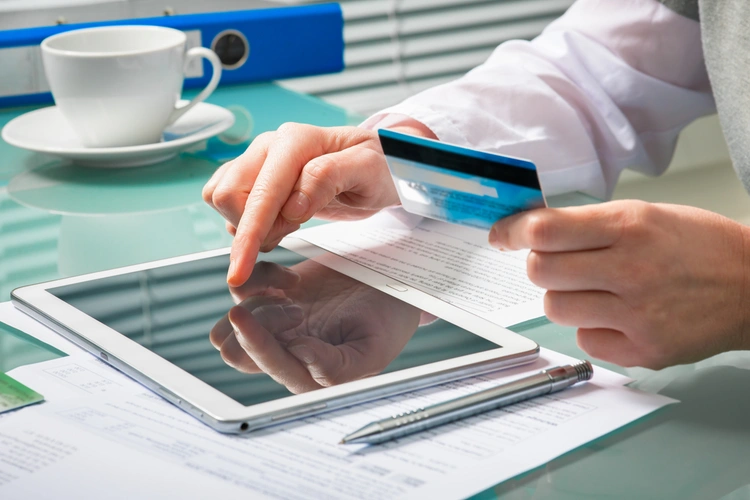What is a business credit card and how does it work?
A business credit card works like a personal credit card, but it’s designed specifically for business purposes. Like other types of credit card, a business credit card is a form of revolving credit, which means you’re in control of how much you repay each month.
Ideally, you should try to clear the balance in full each month to avoid all interest and charges. Or pay at least the minimum amount to avoid late fees (interest will apply).
Business credit cards can be beneficial because you can:
- separate your business and personal spending - making accounting easier
- use them to build your company’s credit profile - if you pay on time, every time
- use them for a variety of business transactions - such as business purchases and expenses
- normally borrow more than with a personal credit card
- request to add or remove cardholders within your business
- see if you’re eligible for a 0% introductory period and rewards, such as cashback or air miles, for example. (These perks are usually self-employed people and businesses with high credit scores)
Bear in mind, business credit cards don’t come with the same consumer protection as personal credit cards, as they’re not covered by the Section 75 of the Consumer Credit Act. This means you may experience more difficulties in returning faulty goods, for example.
Some drawbacks that apply to both business credit cards and personal credit cards include:
- they’re only designed for short-term lending - if you want to borrow a larger amount over a longer period, you may wish to consider getting a loan instead
- your personal credit score could be affected - if you don’t pay on time, every time (this applies if you sign a personal guarantee for a business credit card)
- interest will apply if you don’t repay the balance in full each month
- late payment fees will apply if you pay less than the minimum amount
- foreign transaction fees and annual fees may apply
- cash withdrawals can be expensive using a credit card
- you could become a victim of fraud if a cardholder spends irresponsibly on your card
Tip: Be sure to read the lender’s policy documents before you apply so you know how much interest will be charged and when - and if any fees are applicable.
Who are business credit cards for?
You can apply for a business credit card if you own a business of any size in the UK, from a startup to a limited company. So, if you’re self-employed (known as a sole trader) you can still apply for a business credit card.
How do I qualify for a business credit card?
Each credit card lender follows different criteria. Most lenders, though, will want to confirm information such as:
- your annual turnover
- how long you’ve been trading
- you’re at least 18 years of age
- you’re a permanent UK resident
- you have a UK registered business address.
If you are a sole trader, it’s likely you’ll need to provide both personal and business details (such as your annual turnover and when your business was set up) so it’s a good idea to have supporting documents ready. This should help make your application go smoothly.
As mentioned above, some banks will require you to either already have or open a business account with them before you can apply for a business credit card. While this may involve a little more paperwork, it may be worth it if the bank’s credit card suits your needs, and you fulfil their other eligibility criteria.
How do you get a business credit card?
To get a business credit card, you’ll need to find one that suits your needs before applying and waiting for the lender’s decision. You can apply:
- online
- over the phone
- by post
- in a branch
Here’s a quick run through how to prepare and make your application:
1. Check your personal and business credit reports
The first step is to check your personal credit report and your business credit report.
If you’re a sole trader applying for a business credit card, the lender will normally look at your personal credit history as well as your business credit history (and other factors such as your company’s assets and affordability).
If you spot any errors or accounts you don’t recognise, it’s best to get in touch with the relevant credit reference agency as soon as possible to ask them to update your records. Otherwise, any incorrect information or fraudulent activity could put lenders off.
If you have a bad credit history, lenders may be less likely to lend to you in personal or business capacity, as it could be too risky from their point of view. If they do lend to you, you may face lower credit limits and higher interest rates.
As such, it may be better to wait until negative markers drop off your credit report before applying (6 years after registration), so you have a better chance of accessing more competitive deals (though there are no guarantees).
You shouldn’t apply for credit if you can’t afford to repay it. If you or your business are in financial difficulty, you should seek help from a free debt advice service, such as Citizen’s Advice or StepChange.
2. Compare business credit cards
Here are the main things you should consider when shopping around for the best business credit card for you:
- APR – this includes interest and fees, so it’s a good way to compare the total cost of borrowing on different cards. But remember, the rate you are offered can differ from the rate advertised.
- Fees – annual fees are more common with business credit cards than personal ones, and there are a host of other fees (such as purchase fees, foreign transaction fees, and late fees) to consider.
- Rewards – choose the benefits that will suit your business and that you will make use of (e.g., if you travel a lot for work, a card that offers free travel insurance may be more beneficial than one that offers cashback).
3. Check your eligibility
One of the most important steps is to check your eligibility. Once you’ve found the card that you think best suits your business, look carefully over the eligibility criteria.
Making multiple applications in a short space of time can make you look desperate for credit, which can deter some lenders. So, before you apply, it’s worth using an eligibility checker to find out your chances of getting approved – without leaving a mark on your credit file.
4. Apply for a business credit card
Once you’re confident that you’ve found the best deal for you and you fulfill the eligibility criteria, you can go ahead and apply.
Make sure you fill in all the details accurately, as any discrepancies between the information you provide and the information on your credit report could delay the process - and potentially impact your chances of being approved.
5. Wait for the lender’s decision
Once you’ve submitted your application, the lender will review all the information you’ve provided to decide if they’re willing to offer you a business credit card.
Finding out whether you’ve been approved can take anything from a few hours to around 14 days, depending on how you apply and if the lender needs to make any extra checks. Applying online tends to be the quickest method.
Disclaimer: We make every effort to ensure content is correct when published. Information on this website doesn't constitute financial advice, and we aren't responsible for the content of any external sites.






